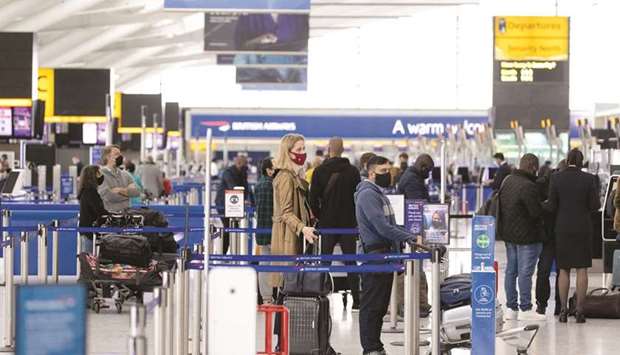Airport processing times have ballooned, post-Covid-19 as authorities need to verify health credentials of travellers, which has already led to confusion in many airports around the world. Pre-Covid-19, passengers, on average, spent about 1.5 hours in travel processes for every journey (check-in, security, border control, customs, and baggage claim).
Current data compiled by the global body of airlines IATA indicates that airport processing times have ballooned to three hours during peak time with travel volumes at only about 30% of pre-Covid-19 levels.
The greatest increases are at check-in and border control (emigration and immigration) where travel health credentials are being checked mainly as paper documents. A modelling suggests that, without process improvements, the time spent in airport processes could reach 5.5 hours per trip at 75% pre-Covid-19 traffic levels, and eight hours per trip at 100% pre-Covid-19 traffic levels.
IATA has already warned of potential airport chaos unless governments move quickly to adopt digital processes to manage travel health credentials (Covid-19 testing and vaccine certificates) and other Covid-19 measures.
Even with traffic around 10% of pre-crisis levels, airports have warned that Covid-19 paperwork and test results are already clogging “pinch points” in check-in and boarding, despite full staffing, a Reuters dispatch showed.
Without swift digitisation of processes including test and vaccine checks, airports could be overwhelmed by a traffic uptick as soon as May, said Emiliano Sorrenti, chief information and technology officer at Aeroporti di Roma, which operates the Italian capital’s Fiumicino and Ciampino airports.
“When we reach just 50% of (pre-crisis) passengers, will we be able to cope with those numbers given the new regulations?” he asks. Fully seamless services that now seem far off will rapidly become a “mandatory level of automation”, he expects.
Without digitisation, document checks will quickly become “unworkable” when travel picks up, IATA warns.
Even at 10% of pre-crisis traffic, test paperwork it said is already creating airport bottlenecks as staff spend 20 minutes with each passenger. A solution suggested by industry experts for smooth restart of the air transport industry is integration of Covid-19 health credentials into already automated processes.
This, they say would need globally recognised, standardised, and interoperable digital certificates for Covid-19 testing and vaccine certificates. Digitalised certificates have several advantages such as avoiding fraudulent documentation, enabling advance “ready-to-fly” checks by governments, reducing queuing, crowding and waiting time in airports through integration with self-service check-in (via the internet, kiosks or mobile phone apps) increasing security through integration with digital identity management being used by border control authorities, reducing the risk of virus transmission via the person-to-person exchange of paper documents. The pandemic has sped efforts by airlines and airports to integrate digital passenger services, information and document checks, while the race is on to deploy “contactless” processes and digital health passes with Covid-19 vaccination and test certificates. “Without an automated solution for Covid-19 checks, we can see the potential for significant airport disruptions on the horizon. Already, average passenger processing and waiting times have doubled from what they were pre-crisis during peak time – reaching an unacceptable three hours. And that is with many airports deploying pre-crisis level staffing for a small fraction of pre-crisis volumes.
“Nobody will tolerate waiting hours at check-in or for border formalities. We must automate the checking of vaccine and test certificates before traffic ramps up. The technical solutions exist. But governments must agree digital certificate standards and align processes to accept them. And they must act fast,” said Willie Walsh, IATA’s Director General.
Over the past two decades, air travel has been reinvented to put passengers in control of their journeys through self-service processes. This enables travellers to arrive at the airport essentially “ready to fly”. And with digital identity technology, border control processes are also increasingly self-service by way of e-gates. Paper-based Covid-19 document check would force travellers back to manual check-in and border control processes that are already struggling even with low volumes of travellers.
Therefore, a common international approach on Covid-19 testing, vaccination, certification, and information as well as promoting digital traveller identity will help early and smooth restart of the air transport sector.
* Pratap John is Business Editor at Gulf Times. Twitter handle: @PratapJohn

Passengers wait at check-in desks in the departures hall in Terminal 5 at London Heathrow Airport. Processing times at airports have ballooned, post-Covid-19 as authorities need to verify health credentials of travellers, which has already led to confusion in many airports around the world.

